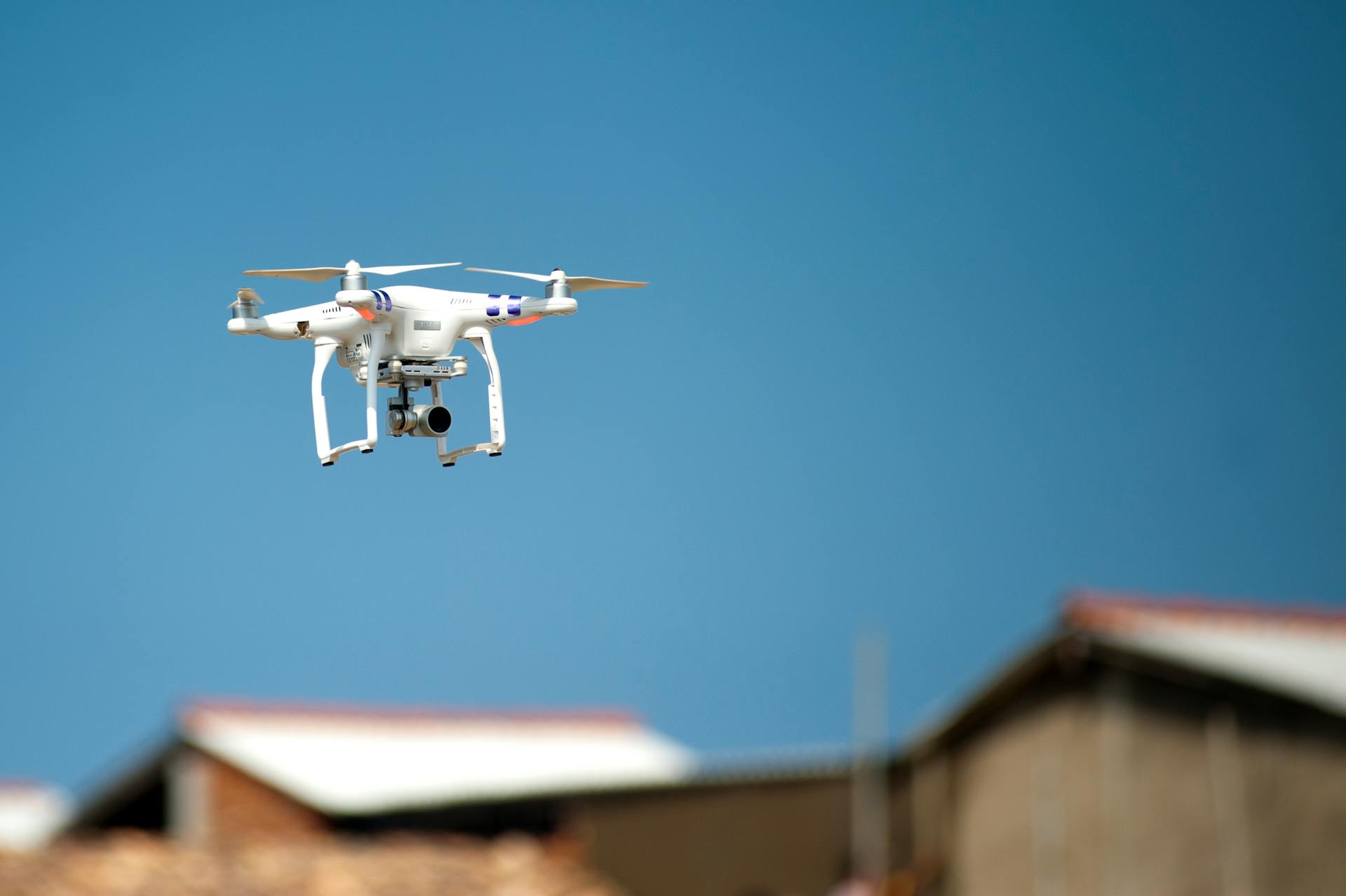
The world of unmanned aerial systems (UAS) is rapidly growing, and with it, a wide range of job opportunities.
According to the article, the average salary for a UAS pilot can range from $60,000 to over $100,000 per year, depending on experience and location.
To get started in this field, you'll need to obtain a UAS pilot certification, such as the Part 107 certification from the Federal Aviation Administration (FAA).
With this certification, you can work as a drone pilot for various industries, including construction, surveying, and filmmaking.
Some of the top locations for UAS jobs include major cities like Los Angeles, New York City, and Chicago, as well as areas with high demand for aerial services like agriculture and mining.
Worth a look: Remote Pilot Small Unmanned Aircraft Systems Study Guide
Career Paths and Jobs
As a drone enthusiast, you're likely wondering about the various career paths available to you. Let's explore some of the options.
You can choose to work as a self-employed drone operator, which means you'll be responsible for finding your own work, negotiating your own rates, and obtaining necessary licenses and insurance for your business.
A different take: Military Drone Pilot Salary
Freelance drone operators are another option, allowing you to work for different companies on a project-by-project basis. This path offers flexibility, but you'll still need to obtain your own licenses and insurance.
If you prefer a more stable income, you can consider working as a full-time drone operator, typically as part of a team.
Here are some of the career paths you can take as a drone pilot:
- Self-Employed Drone Operators
- Freelance Drone Operators
- Professional Drone Operators
- Full-time Drone Operators
Drone pilots can earn high salaries in various fields, including surveying or mapping engineering, real estate photography, and UAV pilot instruction. Let's take a closer look at some of these lucrative fields.
Some sectors where drone pilots can make a decent living include mapping and geographic information systems (GIS), surveying and land management, and search and rescue operations.
Salary and Compensation
The salary and compensation for unmanned aerial systems (UAS) professionals can vary widely depending on the industry, location, and level of experience. The median total pay for a drone pilot in the United States is $85,159, with an average salary of $54,128.
According to Salary.com, the average salary for a drone pilot is $82,976, with a salary range of $61,090 to $100,225. This range is consistent with the estimated pay of $31,031 mentioned in Glassdoor, which includes perks such as cash bonuses, commissions, tips, and profit sharing.
Drone pilots in the aerospace and defense industry earn an average salary of $155,230, making it one of the highest-paying industries for UAS professionals. In contrast, film and video drone pilots earn an average of $69,107.
The hourly rate for drone pilots also varies by experience level. According to Salary.com, the typical hourly rate for drone pilots ranges from $29 to $48, with an average hourly rate of $40. Experienced drone pilots earn an average of $40 per hour, while senior drone pilots make an average of $56 per hour.
Here's a breakdown of the average hourly rate for drone pilots by experience level:
Overall, the salary and compensation for UAS professionals can be lucrative, especially in industries such as aerospace and defense. However, it's essential to consider factors such as location, experience, and industry when determining one's earning potential.
Job Types and Locations
In the United States, drone pilot salaries vary significantly depending on the location.
The Northeast region offers the second-highest average salary at $87,068 per year, while the West region takes the top spot with an average salary of $90,195.
Here's a breakdown of average drone pilot salaries by region:
Some cities in the United States offer higher salaries than others. For example, drone pilots in Los Angeles, California earn an average salary of $93,157 per year, while those in Miami, Florida earn an average of $80,529.
Operator by Location
The location of the job can greatly impact the salary for a drone operator. In the Northeast, drone pilots earn an average salary of $87,068 per year.
Drone pilots in the West tend to earn the highest salary, with an average of $90,195 per year. The Midwest averages $81,153 per year.
The South has the lowest-paying region for drone pilots, with an average salary of $76,695 per year. This is a significant difference from the highest-paying region in the West.
Here's a breakdown of drone pilot salaries by region:
Agriculture: Precision Earnings
Drone pilots in agriculture often find competitive salaries due to the critical role drones play in precision farming. The average annual salary for agricultural drone pilots ranges from $50,000 to $70,000, with potential for higher earnings based on experience and expertise.
Agricultural drone pilots can earn salaries over $100k in certain sectors, but this is not the norm. It's worth noting that salaries can vary widely depending on the specific job and location.
Drone pilots can make a decent living in the agriculture sector, with some earning upwards of $70,000 per year. However, salaries can be lower in some areas, making it essential to research the market and job requirements.
Employment and Certifications
Holding a Federal Aviation Administration (FAA) Part 107 Remote Pilot Certificate is often a prerequisite for drone pilot positions in the United States.
Drone pilots with relevant certifications and qualifications can command higher salaries, with additional certifications like thermal imaging or industry-related qualifications further enhancing earning potential.
The job market for drone pilots is competitive, with only a handful of salaried positions nationwide, according to job listings.
There are three primary categories of employment opportunities for drone pilots: Industry Professionals Operating Within a Drone Program, Self-Employed Droneprenuers, and Client-based/Freelance Drone Pilots.
Who Employs?
If you're looking to become a drone pilot, you're probably wondering who employs them. Industry professionals operate within a drone program, which is a common category for drone pilots.
These programs can be found in various sectors, including construction, agriculture, and real estate. The job market for drone pilots is competitive, with only a handful of salaried jobs available nationwide.
The best job listings for drone pilots yielded only about one hundred jobs. This scarcity is a good reason to consider alternative employment options.
Here are the three primary categories of employment for drone pilots:
- Industry Professionals Operating Within a Drone Program
- Self-Employed Droneprenuers
- Client-based/Freelance Drone Pilots
These categories are not exhaustive, but they are the most common ways drone pilots make a living.
Certification and Qualifications
Having the right certifications and qualifications can make a big difference in your drone pilot career. Holding a Federal Aviation Administration (FAA) Part 107 Remote Pilot Certificate is often a prerequisite for drone pilot positions in the United States.
Drone pilots with relevant certifications tend to command higher salaries. Additional certifications, such as thermal imaging or specific industry-related qualifications, can further enhance earning potential.
Obtaining a FAA Part 107 Remote Pilot Certificate can open up more job opportunities and higher paying positions.
Drone Industry
The drone industry is booming, and with it, comes a wide range of salary opportunities for drone pilots. Drone pilots in the aerospace and defense industry earn an average salary of $155,230.
The industry you work in significantly impacts your salary as a drone pilot. Different sectors offer varying compensation packages based on the demand for drone services and the complexity of missions.
Agriculture and construction often offer competitive salaries due to the critical role drones play in optimizing operations and increasing efficiency. This is reflected in the average salary for construction drone pilots, which is $79,368.
Film and entertainment may provide higher salaries for drone pilots involved in cinematic aerial cinematography, where specialized skills are required, with an average salary of $69,107.
Public safety and emergency response sectors may offer attractive compensation to pilots supporting search and rescue missions or disaster assessments.
Here's a breakdown of average drone pilot salaries across various industries:
Frequently Asked Questions
What is unmanned systems degree?
The unmanned systems degree focuses on the impacts and leading-edge technology of unmanned systems operations in aviation, preparing students for careers in civilian, government, and military sectors. This degree explores the cutting-edge applications of unmanned systems in various industries.
How much does a unmanned aerospace system sensor operator make in the Air Force?
A Unmanned Aerospace Systems Sensor Operator at the US Air Force can earn an estimated $6K-$8K per month, with an average base salary of $7K per month. This total pay range includes base salary and additional pay.
Featured Images: pexels.com


